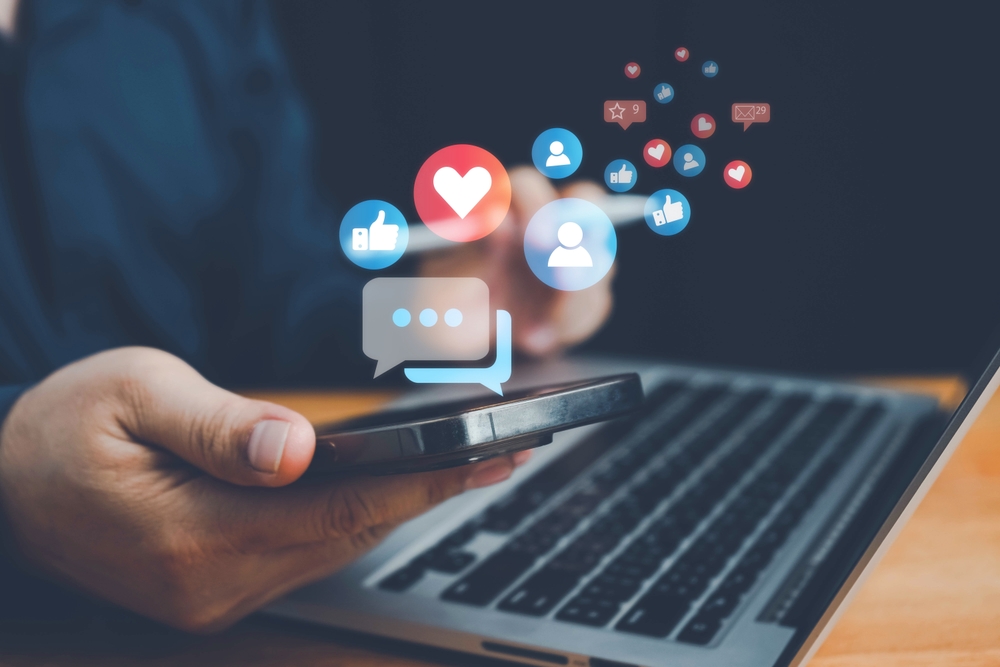The Microsoft Attention Span study found that the average human attention span had decreased from 12 seconds to 8 seconds over the span of 13 years, with social media usage identified as a major contributing factor.
Social media has become an integral part of our modern lives, but its effects on mental and physical wellbeing are complex and multifaceted. While it can foster connection and community, concerns exist regarding its potential to contribute to anxiety, depression, and even physical health issues.
Here, Click Consult presents exclusive survey data, revealing the number of hours Gen Z spend on their socials vs. Millennials and Silent Gen, as well 5 tips on how to stay informed without social media overload.
STAY INFORMED BUT DON’T OVERLOAD
With social media comes a nonstop stream of news that can be addictive. It’s important to stay informed, but too much exposure can be overwhelming and lead to feelings of stress, anxiety, and burnout. Limit your news intake to a few trusted sources rather than getting your information from everywhere possible. Stop checking the news every time there’s a notification, which can make you feel on edge all day, and limit your news reading to a specific time once a day.
CURATE YOUR SOCIAL MEDIA FEEDS
The content you see on social media every day has a major impact on your mood and mindset and following accounts that post content that makes you feel anxious or angry seriously affects your mental health. Be aware of your triggers, unfollow and block accounts that post negative content, and mute keywords and hashtags that trigger stress and anxiety and lead to doom-scrolling – and instead, curate your feed and algorithm to ensure you only see positive content.

MAKE IT HARDER FOR YOURSELF
Turn off auto-login on your social media apps. Having to enter your username and password every time you want to scroll will make you more mindful of what you’re doing and make you stop and think about whether you really need to be logging on, preventing you from mindlessly picking it up and scrolling without noticing what you’re doing.
SET LIMITS
Set time limits for yourself and try to limit yourself to only using social media at certain times of the day. Avoid first thing in the morning, which can start your day off in a bad mood, and before bed, which will cause you to have negative thoughts racing through your mind when trying to sleep.
SEEK SUPPORT
Doomscrolling and social media addiction can have a significant impact on your mental health, leading to feelings of comparison, loneliness, and depression – and it’s important to seek support if you’re struggling. Reach out to friends and family if you’re feeling overwhelmed and consider getting help from a mental health professional who can help you with strategies to build a healthier relationship with social media.
Generational Differences: Gen Z vs Millennials Vs Silent Gen
A quarter of Gen Z and a fifth of Millennials report spending 4 to 6 hours daily on social media platforms, while almost a fifth of Gen Z spend over 7 hours a day engaging with social media.
A 2018 study by Lancaster University researchers, which involved over 10,000 participants, investigated the relationship between social media usage and depression symptoms in adolescents. They found a correlation between high social media use and an increased likelihood of reporting depression symptoms, particularly for girls. More specifically, the study found that teenage girls who spent five or more hours a day on social media were three times more likely to report symptoms of depression compared to girls who used social media for one to three hours a day.
In stark contrast to the younger generations, the ‘Silent Generation’ (people born between 1928 and 1945) predominantly reported no change to their mental or physical health due to social media, with Click Consults survey respondents saying, “I’m older so I believe that helps my mental health not getting affected” and “I’m the generation that doesn’t believe everything in social media is true…” This disparity is likely due to the limited exposure to social media during their formative years.
There is also a significant difference in screen time between generations, with 91% of the Silent Generation reporting spending less than an hour per day on social media.
Intentional use may be a mitigating factor in whether social media negatively impacts health. Individuals who reported no negative impacts across all generations tended to demonstrate greater intentionality in their usage patterns, including limiting their time on these platforms and consciously choosing the content they consume.
Doomscroll Burnout
The word “overwhelmed” emerges as the most frequently used by survey respondents to describe negative feelings associated with social media. This feeling may stem from the constant influx of information, the pressure to conform to unachievable lifestyle and beauty standards, or the inability to switch off and take time away from the screen.
The term “doom scrolling” emerged in recent years, notably during the pandemic, to describe the habit of compulsively scrolling through social media for hours at a time. The term is synonymous with feelings of anxiety and burnout due to not being able to stop, and usually coming away feeling worse than when you started. One respondent from our survey said, “I’m addicted to doom scrolling and find it very difficult to put my phone down, it’s affecting my physical…and mental health by too much screen time.” Another claimed, “It can sometimes suck you in and before you know it a few hours have passed.”
Many respondents in the Click Consult study mentioned the negativity spread by other users of social media, claiming “There is so much aggression in postings…” and expressed frustration at “the judgement or trolling people do for their own amusement.” One respondent stressed the importance of limiting online connections: “I limit the ‘friends’ that I have to ensure positivity and do not accept random people.” Another explained: “I…use social media more to browse and read rather than interacting with others so I don’t feel stressed.”
Finding Balance
Anna Shears, a positive psychologist and accredited coach. Shears states that
“Social media effects often interact with pre-existing conditions, and long-term impacts are still being studied as social media is relatively new.”
“In summary, I would say that a balanced approach is necessary when looking at the effects of social media on mental health. Disproportionate or excessive use can have negative consequences, whereas when used in a meaningful way as a tool to seek support or guidance can be useful. Proportionate use by younger people should be moderated with clear boundaries to ensure a healthy balance.”
How Quality Control is Transforming the Way We Experience Technology





